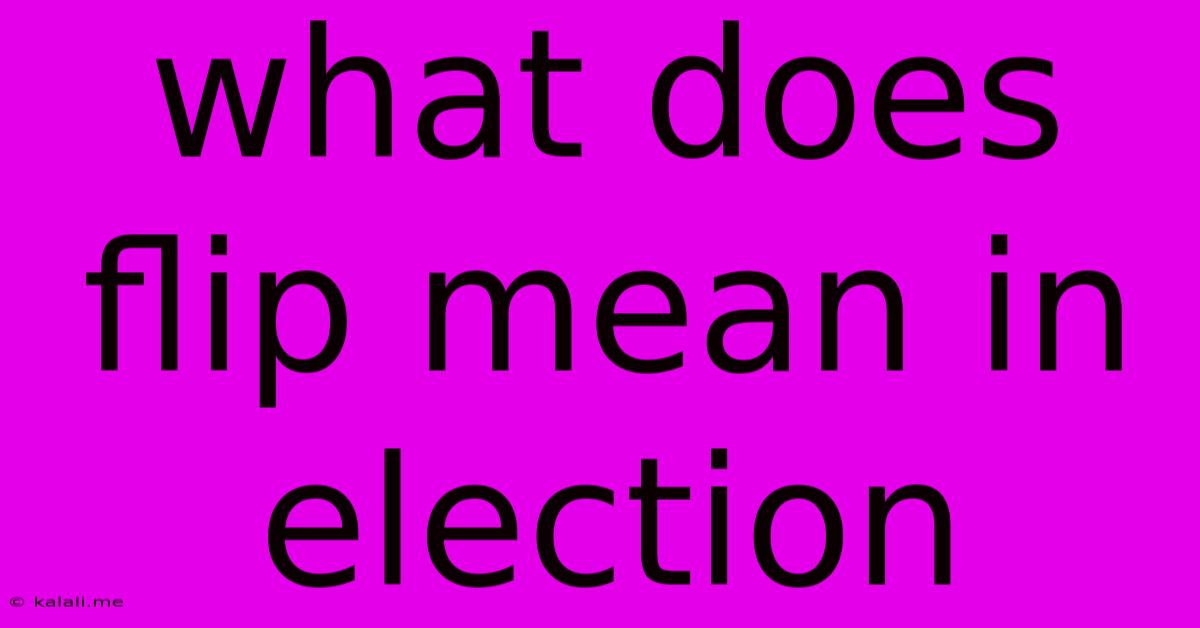What Does Flip Mean In Election
Kalali
May 23, 2025 · 3 min read

Table of Contents
What Does "Flip" Mean in an Election? Understanding Electoral Shifts
The term "flip" in the context of elections refers to a significant shift in political control of a specific electoral district or office. It signifies a change from one party's dominance to another's, often signifying a significant change in the political landscape. This article will explore the meaning of "flip" in detail, examining its various applications and implications. Understanding what constitutes a "flip" and its broader context is crucial for anyone following elections and political trends.
Different Types of "Flips"
The term "flip" isn't limited to one specific scenario; it can apply to several election-related occurrences:
-
Flipping a Congressional District: This is perhaps the most common usage. A "flipped" Congressional district is one that previously elected a representative from one party (e.g., Republican) but now elects a representative from the opposing party (e.g., Democrat). This can indicate a shift in voter sentiment within that district, possibly due to changing demographics, economic conditions, or the appeal of specific candidates.
-
Flipping a State Legislature: Similar to Congressional districts, a state legislature can "flip" when control of one or both chambers (Senate and House) shifts from one party to another. This can drastically alter the legislative agenda and the state's political direction.
-
Flipping a State in a Presidential Election: A "flipped" state is one that previously voted for a candidate from one party in a previous election but now votes for a candidate from the opposing party. These are significant shifts, often indicating broader national trends and potentially influencing the overall outcome of the Presidential race. Swing states are particularly prone to flipping.
-
Flipping Local Elections: The term "flip" also applies to local elections, such as mayoral races or city council elections. A flipped local election indicates a change in political control at the municipal level.
Factors Contributing to a Flip
Several factors can contribute to an electoral "flip":
-
Candidate Quality: A strong and charismatic candidate can attract voters from the opposing party, leading to a flip. Conversely, a weak or unpopular candidate can result in their party losing a previously held seat.
-
National Political Climate: The overall national political climate significantly impacts local elections. A wave election, where one party gains significant traction nationally, can lead to numerous flips at the state and local levels.
-
Demographic Shifts: Changing demographics within a district or state can lead to electoral shifts. An increase in a particular demographic group might favor one party over another.
-
Economic Conditions: Economic factors, such as job growth or recession, can significantly influence voter choices, potentially resulting in a flip.
-
Key Issues: Evolving key issues and voter priorities can sway election outcomes. Issues like healthcare, education, or environmental concerns can influence voters' decisions and lead to unexpected flips.
Analyzing Electoral Flips: Meaning and Implications
Analyzing electoral flips offers valuable insights into the changing political landscape. They can:
-
Indicate Shifts in Public Opinion: Flips are often a barometer of changing public opinion on key issues and the popularity of political parties.
-
Highlight Regional Trends: Studying flipped districts or states can help identify regional trends and understand the factors driving political shifts in specific areas.
-
Influence Future Elections: Understanding the reasons behind flips is crucial for future election strategies and campaign planning for both parties.
In conclusion, "flip" in the context of elections signifies a notable change in political control. Understanding the various types of flips, contributing factors, and their implications is vital for comprehending the dynamic nature of the political process. By analyzing these shifts, we can gain valuable insights into evolving public opinion, regional trends, and the forces shaping the future of elections.
Latest Posts
Latest Posts
-
X 2 Y 2 1 3 X 2y 3
May 24, 2025
-
Power Automate Update Sharepoint List Item
May 24, 2025
-
How To Get Marker Off Wood Table
May 24, 2025
-
When You Look Into The Abyss
May 24, 2025
-
Square Root Within A Square Root
May 24, 2025
Related Post
Thank you for visiting our website which covers about What Does Flip Mean In Election . We hope the information provided has been useful to you. Feel free to contact us if you have any questions or need further assistance. See you next time and don't miss to bookmark.